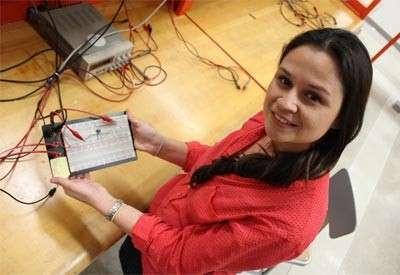Shedding light on solar power

Everyone wants to save energy, but not everyone knows where to start. Grid Resources, a startup based out of the Centre for Urban Energy's iCUE incubator, is developing a new website that seeks to help homeowners make informed decisions on installing solar panels. Thanks to the Norman Esch Engineering and Entrepreneurship Awards, they'll soon have the funding to make that vision a reality.
"Maybe you've thought of being more proactive in saving energy, but it's hard to know what solar panels to use, how many you would need, how much it costs to put that on the roof, and how much money you would save," said Diana Ospina, a third-year Ryerson engineering student and the entrepreneur (with Andrew Clare) behind the initiative.
"For homeowners, it would be interesting for them to know an exact number of months, weeks, or years when they'll be able to make up their investment. When you're making a purchase, that's the first thing you want to know."
Using a homeowner's address, the Grid Resources website will calculate the amount of solar power the house can receive according to the latitude and longitude coordinates. Using data of the house's previous 18 months of energy consumption, it will calculate how much power the household will actually use. With these two figures, the site will reveal how much energy a house can produce with a solar panel, and how much money a homeowner can potentially save.
"People have such a hard time understanding how solar works, how much they'll save, and what policies are in place to help them," said Ospina. "Right now, if you call for your utility bill and ask for this information, it may take weeks to come in the mail. It's not as easy as entering 18 months of history, entering a home address, and getting a result within 10 minutes."
Ospina is one of 13 Ryerson student entrepreneurs receiving an Esch Award at tonight's Esch Night of Celebration. The awards support student-led technology ventures and startups by providing funding to Ryerson engineering and architectural science students with innovative technology-driven products and services. All undergraduate and graduate students are eligible for the prizes, which come in three stages ($5,000, $8,000 and $25,000). Ospina is a stage one winner, and will use the $5,000 for market analysis and consulting before launching the site.
She credits Ryerson's culture of entrepreneurship for setting her on a new trajectory. "I didn't think I would be an entrepreneur, but there are so many opportunities here," said Ospina. "They're always promoting it. They don't just give you an award: they have seminars and entrepreneurship tutorials, where they give information of what to think about when you're launching an idea. Who are you selling to? What would they pay? That's the stage that I'm in."
Provided by Ryerson University


















